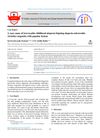
Search
for
Sort by
Research
750-780 / 1000+ results
research Photographic Documentation of the Effectiveness of 1 mg Oral Finasteride in the Treatment of Androgenic Alopecia in Men in Routine General Practice in Switzerland
1 mg/day oral finasteride significantly improves hair growth in men with male pattern baldness.
research Genome-Wide Association Study in Alopecia Areata Implicates Both Innate and Adaptive Immunity
Alopecia areata involves both innate and adaptive immunity, with specific genes linked to the disease.
research Genomewide Scan for Linkage Reveals Evidence of Several Susceptibility Loci for Alopecia Areata
Certain genes on chromosomes 6, 10, 16, and 18 may increase the risk of alopecia areata.
research 1,25-Dihydroxyvitamin D Resistance, Rickets, and Alopecia
A genetic defect in vitamin D receptors causes severe rickets and hair loss in children, but some heal as they age.

research Immune Deficiency-Related Enteropathy-Lymphocytopenia-Alopecia Syndrome Results from Tetratricopeptide Repeat Domain 7A Deficiency
A deficiency in the TTC7A gene causes immune problems, gut issues, and hair loss.
![Influence of FHIT on Benzo[a]pyrene-Induced Tumors and Alopecia in Mice: Chemoprevention by Budesonide and N-Acetylcysteine](/images/research/f8f56777-f891-4879-8c45-c87d6aa82563/small/35499.jpg)
research Influence of FHIT on Benzo[a]pyrene-Induced Tumors and Alopecia in Mice: Chemoprevention by Budesonide and N-Acetylcysteine
Budesonide and N-acetylcysteine reduced tumors and alopecia in mice, regardless of FHIT gene status.
research A Scandinavian Case of Skin Fragility, Alopecia, and Cardiomyopathy Caused by DSP Mutations
A child with skin and heart issues had rare genetic mutations affecting skin and heart cell cohesion.

research Biallelic Variants in Lanosterol Synthase (LSS) Cause Palmoplantar Keratoderma-Congenital Alopecia Syndrome Type 2
Certain genetic changes in the LSS gene cause a rare skin and hair condition.
research Azathioprine-Induced Alopecia And Leukopenia Associated With NUDT15 Polymorphisms
Certain genetic variations can make people more likely to experience hair loss and low white blood cell count from azathioprine.
research An Australian Family With Macular Dystrophy Linked to Autosomal Recessive Alopecia Universalis
An Australian with rare hair loss and eye conditions had a gene linked to both, not seen together before.

research Genome-Wide Association Study of Alopecia Areata in Taiwan: The Conflict Between Individuals and Hair Follicles
Certain genetic variants linked to immune response increase the risk of alopecia areata in Taiwanese people.

research Using Artificial Intelligence to Analyze Publicly Available Social Media Posts to Understand Patient Perspectives Toward Specific Treatments of Alopecia Areata
Patients generally feel positive about alopecia areata treatments, but emotions vary by treatment type.

research Alopecia Areata Is Associated With MICA and an Extended HLA Haplotype
Certain genes are linked to the risk of developing Alopecia Areata.

research Ichthyosis Follicularis, Alopecia, and Photophobia Syndrome in a Saudi Child: A Case Report
An 8-year-old Saudi boy was diagnosed with a rare genetic disorder causing hair loss, skin issues, and light sensitivity.

research Clinical Case of Alopecia Totalis in Pediatric Practice
An 11-year-old child with total hair loss may have a genetic autoimmune disease, and the outlook for hair regrowth is not good.

research Alopecia Totalis in an Infant
An infant with complete hair loss was diagnosed with a genetic disorder affecting hair growth.

research A Rare Cause of Irrevocable Childhood Alopecia Feigning Alopecia Universalis: Atrichia Congenita With Papular Lesions
An 8-year-old girl has a rare genetic disorder causing complete, irreversible hair loss and skin bumps.

research Ichthyosis Follicularis with Alopecia and Photophobia Syndrome (IFAP): A Case Report and Review of the Literature
The document describes a rare case of IFAP syndrome, a genetic condition with symptoms of hair loss, light sensitivity, and scaly skin.

research Odd-Looking Hair and Progressive Alopecia in Mother and Son
Mother and son diagnosed with a rare genetic hair loss condition with no effective treatment.

research Identification of Ferroptosis-Related Biomarkers in Alopecia Areata Through Machine Learning
Four genes are potential markers for hair loss condition alopecia areata, linked to a specific type of cell death.
research Overview of Alopecia Areata
Alopecia areata is a genetic and immune-related hair loss condition that is often associated with other autoimmune diseases and does not typically cause permanent damage to hair follicles.

research Six Novel Susceptibility Loci for Early-Onset Androgenetic Alopecia and Their Unexpected Association with Common Diseases
Six new genetic regions linked to early hair loss also connect to Parkinson's disease and prostate cancer, possibly leading to new treatments.
research Alopecia Areata: Animal Models
Alopecia areata is influenced by genetics and immune system factors, and better understanding could improve treatments.

research Frontal Fibrosing Alopecia: Reflections and Hypotheses on Etiology and Pathogenesis
FFA's causes may include environmental triggers and genetic factors.

research Alopecia Areata: Clinical Review and Treatment Approaches
Alopecia Areata has no guaranteed treatment for hair regrowth, but options like corticosteroids and minoxidil are used, with future research focusing on genetic and immune therapies.

research Ultrasound-Activated Particles as CRISPR/Cas9 Delivery System for Androgenic Alopecia Therapy
Scientists have created a new hair loss treatment using ultrasound to deliver gene-editing particles, which resulted in up to 90% hair regrowth in mice.

research Guidelines of Care for Androgenetic Alopecia
Treat genetic hair loss early with FDA-approved medications and consider hair transplantation.

research Fine Mapping of the Human AR/EDA2R Locus in Androgenetic Alopecia
Genetic marker rs12558842 strongly linked to male hair loss.
research Methotrexate for the Treatment of Pediatric Alopecia Areata
Methotrexate is generally safe and often effective for treating hair loss in children.